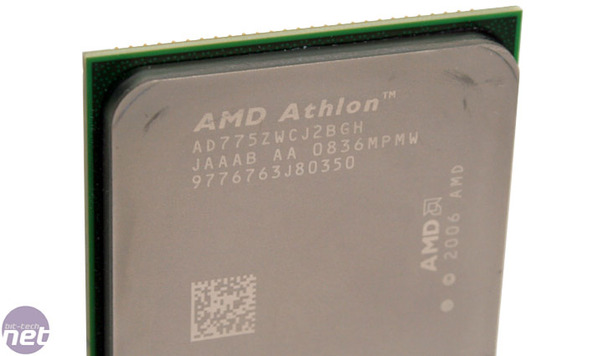
Overclocking
We thought the 89W TDP should unlock some additional overclocking headroom, but it doesn't seem to have been the case. Turning on the Advanced Clock Calibration (ACC) on the Asus M3A79-T, cranking up the voltage to 1.5V (slowly increasing from 1.45V) we managed to crank up the multiplier only and eke out just 3.1GHz stable which is somewhat disappointing as we were hoping for something nearer 3.5GHz. In contrast, the retail Intel E5200 hits 4GHz without even getting out of breath at just 1.4V.In terms of winning back the enthusiasts, AMD needs to get its 45nm parts out in a jiffy for overclockers to be satisfied. 3.1GHz is still pretty good and we might just be one CPU among many launching today that doesn't seem to be capable of super high clocks, however it doesn't bode well to the potential of further retail speeds over 2.7GHz in the future.
Conclusions
The Athlon X2 7750 is pretty much the same price as the Intel Pentium Dual Core E5200 at the time of writing, but its performance is mostly better overall. Considering we have recommended the Intel Pentium Dual Core E5200 for the last few months on the trot in our buyers guide, we'd have to conclude the 7750 is also a very good processor that should give this a run for its money.It actually feels good to write something positive for AMD after such a time of Conroe domination, because for a small part it's great to have some serious competition again. We'd have to harp back to the sub 1GHz, 180nm P3 (Coppermine) versus Athlon (Thunderbird) fight to get that sort of playing field again.

In a clock for clock comparison, the 2.5GHz 7550 actually comes out ahead of the Intel Pentium Dual Core E5200 in many of our tests as well, although not all - in all our games tests with both graphics cards, the new Kuma processors came out consistently on top which is unusual territory for AMD K10 CPUs. What the new Kumas do achieve is basically making the more expensive triple-core processors redundant. The Phenom X3 8450 in particular with its low 2.1GHz clock can't keep up where pure single threaded performance is needed, but the Kuma chips still generally manage to keep up with the cheapest Phenom tri-core where the benchmark does fold in its favour.
The problem AMD is has is that every dual core it currently has on the market is incredibly inexpensive, because its premium Phenom quad core chips had to drop their prices to successfully compete. This has basically compressed the market underneath it meaning CPUs are very closely priced. Add into this these new Kuma 7000-series CPUs into an already compact market and the fact that AMD has royally screwed itself when it comes to naming products and giving them clock speeds: we've seen 6000+ at 3.1GHz and 3.0GHz, 5400+ at 2.6GHz and 2.7GHz for example. When you mix all of that together and you've got a nice soup of customer confusion.
Unless AMD drops a number of K8 CPUs now and replaces them with Kuma-based alternatives, it's going to have its CPUs compete with each other in a sea of grey and it'll leave companies with excess stock one way or the other. Then what happens if Intel decides to cut its E5200 price? We've got another cascade reaction with more ripples than the Core 2 Quad Q6600 versus Phenom 9850/9950 price war.
OK, ultimately that means cheaper products which always ends up benefitting the consumer, but we wonder how AMD can keep up such a strategy in the long term, after all, we always want to see competition.
Final Thoughts
For enthusiasts, AMD has finally done the best it can with its 65nm K10 core although we have to say it's too little too late as a K10 dual core would have been competitive 12 months ago. Even then though, the lack of overclocking headroom and higher power consumption would still turn today's cost concious power users towards Intel's 45nm alternatives. We'll delve in platform value and how overclocking affects the performance results later in the week.While the Athlon X2 7700 series CPUs may not twist the nipples of our readers quite so much, for the general public who just want a cheap upgrade with great, well rounded performance, they're a decent heart to a great platform when combined with a 780G board and an ATI Radeon HD 4800 graphics card. What's more, the new Athlon X2 7750 Black Edition and 7550 CPUs appear to offer better price to performance over Intel's competitive offerings and they're certainly worth buying over the older K8 Athlon X2s.
AMD Athlon X2 7750 Black Edition
- Performance
- x
- x
- x
- x
- x
- x
- x
- x
- -
- -
- 8/10
- Value
- x
- x
- x
- x
- x
- x
- x
- x
- -
- -
- 8/10
- Overall
- x
- x
- x
- x
- x
- x
- x
- x
- -
- -
- 8/10
AMD Athlon X2 7550
- Performance
- x
- x
- x
- x
- x
- x
- x
- -
- -
- -
- 7/10
- Value
- x
- x
- x
- x
- x
- x
- x
- x
- -
- -
- 8/10
- Overall
- x
- x
- x
- x
- x
- x
- x
- -
- -
- -
- 7/10
Score Guide

MSI MPG Velox 100R Chassis Review
October 14 2021 | 15:04








Want to comment? Please log in.